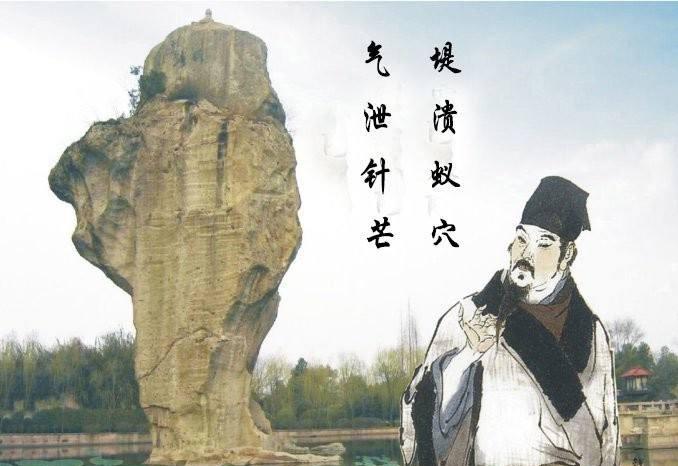Fan Ye (398-445 AD), courtesy name Weizong, was a native of Shunyang (present-day Nanyang, Nanyang) and Fan Ye (魏宗), whose life was roughly during the Southern Dynasty's Liu Song Dynasty. He was the fourth son of his father Fan Tai. His mother was Fan Tai's concubine. Probably because of the low status of the birth mother, so no one cared when he was born, his mother gave birth to him in the toilet, and he was hit by a brick on the forehead, so Hu Fan Ye had a nickname, called "Fan Brick". A famous historian of ancient China. Fan Ye was eager to learn since childhood, read the history of the classics, was good at literature, could be a book, and served as an official Shangshulang. Emperor Wen of Song angered Liu Yikang in the first year (424) of the reign of Emperor Yuanjia and later moved to Taishou (太守) of Xuancheng Commandery (宣城郡, in modern Xuancheng, Anhui). In the twenty-second year of Yuan Jia (445), he was sentenced to death for treason after being accused of plotting to support Liu Yikang, at the age of 48.
Fan Ye's greatest contribution to society in his lifetime was the writing of the Book of the Later Han Dynasty, which was later called one of the first four histories. Starting from Ren Xuancheng Taishou, he gave full play to his special skills in the history of the Later Han Dynasty and his beautiful writing, angrily wrote the Book of later Han, and after more than a dozen cold and hot summers, Fan Ye completed the eighty columns of the Book of Later Han, a total of one hundred volumes (because the ji biography was divided into upper and lower volumes). Just as he was studying diligently, collecting information day and night, and writing the Ten Zhi, he was accused of participating in the conspiracy to establish Liu Yikang. In December of the 22nd year of Yuan Jia, Fan Ye was arrested and killed. The Ten Zhi of the Book of the Later Han Dynasty were also stillborn and would never come out.
Due to Fan Ye's high literary and historical attainments, the Book of the Later Han Dynasty written by him is fluent in writing, concise and thorough in narrative, and well-structured, with very few repetitions and omissions in the book. As soon as this book came out, everyone rushed to read it, and the other Later Han books were gradually eliminated except for Yuan Hong's "Later Han Dynasty". It is a handle that goes its own way so that others have no way to go.
This fellow, who is proud of his talents, has any hidden feelings in committing chaos, and we will not comment. However, the gorgeous and beautiful history books are true and true, and some historians have commented: its "Book of the Later Han Dynasty" is beautiful in words, concise and fluent, not only is it accustomed to using a large number of pairs of sentences and whole sentences, but also in the sentence form, there are four or six standard piao body forms between the four and six phases, and the sentences are obviously inclined to be neat and tidy; Fan Ye is also committed to the pursuit of the sound and rhyme beauty of language, using the laws of phonology to embellish the creation of the preamble theory, and its prologue praises, the words are exquisite, the syllables are harmonious, the sonorous and recitable, and the rhythm is beautiful.
It is also worth admiring that this fellow Fan Ye is an atheist who opposes the doctrine of mandate of heaven and the doctrine of charades. In the "Biography of Li Tong", he commented on Li Tong's incitement to Liu Xiu's edict that "Liu Clan revival, Supplemented by Li Clan": "The life of the Heavenly Dao, the saint is difficult to say, the situation is speculative and subtle, rampant and vain blessings, defiling the clan relatives, with all the merits!" Li Tong and Liu Xiuke are also fellow Nanyang compatriots, and he is also ruthless in approving them. He also included Zhang Heng's anti-plot in the "Biography of Zhang Heng", indicating an attitude of approval. These two Nanyang people are still more temperamental.
Fan Ye's progressiveness is also reflected in his courage to expose dark politics, sympathy and praise for justice. On the one hand, the Book of the Later Han Dynasty exposes the magnates of the fish and meat people, and on the other hand, it also praises those middle- and lower-class people who are strong and upright and are not afraid of rape. In the "Biography of the Party Gong", he set up a biography for twenty-one people, tried his best to praise their integrity, and also wrote vividly about Zhang Jian, Fan Huan, Li Bing and others. Although Fan Ye sympathized with the suffering of the people, he opposed the peasant uprising, and he basically held a negative attitude toward the Yellow Turban Uprising, and did not establish a message to the leader of the uprising, Zhang Jiao, and others.
You see that, right? This is the spirit of the "Er gang mountain" in the area of Deng Huai on the southwest border of Nanyang, which is honest, righteous, and admitting to death.

I didn't find Fan Ye's portrait, this may be it
Book of the Later Han Dynasty
Fan Ye's hometown, Shunyang River, is probably under the waters of The Danjiang Reservoir Liguan Bridge